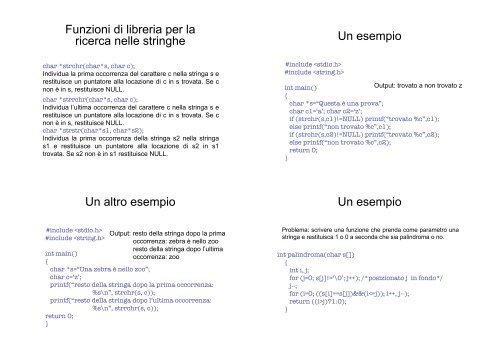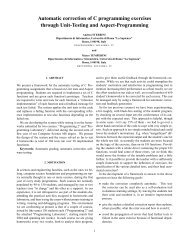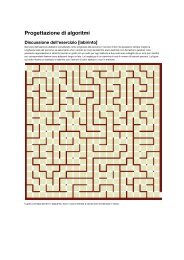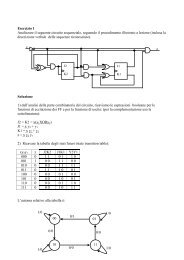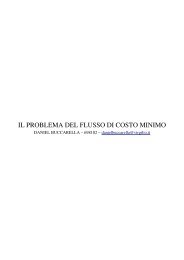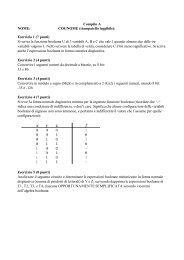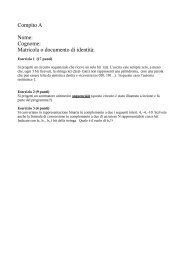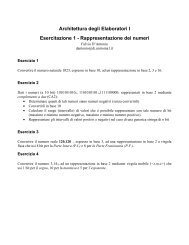You also want an ePaper? Increase the reach of your titles
YUMPU automatically turns print PDFs into web optimized ePapers that Google loves.
Funzioni di libreria per la<br />
ricerca nelle <strong>stringhe</strong><br />
char *strchr(char*s, char c);<br />
Individua la prima occorrenza del carattere c nella stringa s e<br />
restituisce un puntatore alla locazione di c in s trovata. Se c<br />
non è in s, restituisce NULL.<br />
char *strrchr(char*s, char c);<br />
Individua l’ultima occorrenza del carattere c nella stringa s e<br />
restituisce un puntatore alla locazione di c in s trovata. Se c<br />
non è in s, restituisce NULL.<br />
char *strstr(char*s1, char*s2);<br />
Individua la prima occorrenza della stringa s2 nella stringa<br />
s1 e restituisce un puntatore alla locazione di s2 in s1<br />
trovata. Se s2 non è in s1 restituisce NULL.<br />
#include <br />
#include <br />
Un altro esempio<br />
int main()<br />
{<br />
char *s=“Una zebra è nello zoo”;<br />
char c=‘z’;<br />
Output: resto della stringa dopo la prima<br />
occorrenza: zebra è nello zoo<br />
resto della stringa dopo l’ultima<br />
occorrenza: zoo<br />
printf(“resto della stringa dopo la prima occorrenza:<br />
%s\n”, strchr(s, c));<br />
printf(“resto della stringa dopo l’ultima occorrenza:<br />
%s\n”, strrchr(s, c));<br />
return 0;<br />
}<br />
#include <br />
#include <br />
Un esempio<br />
int main()<br />
Output: trovato a non trovato z<br />
{<br />
char *s=“Questa è una prova”;<br />
char c1=‘a’; char c2=‘z’;<br />
if (strchr(s,c1)!=NULL) printf(“trovato %c”,c1);<br />
else printf(“non trovato %c”,c1);<br />
if (strchr(s,c2)!=NULL) printf(“trovato %c”,c2);<br />
else printf(“non trovato %c”,c2);<br />
return 0;<br />
}<br />
Un esempio<br />
Problema: <strong>scrivere</strong> una funzione che prenda come parametro una<br />
stringa e restituisca 1 o 0 a seconda che sia palindroma o no.<br />
int palindroma(char s[])<br />
{<br />
int i, j;<br />
for (j=0; s[j]!=‘\0’; j++); /*posizionato j in fondo*/<br />
j--;<br />
for (i=0; ((s[i]==s[j])&&(ij)?1:0);<br />
}


